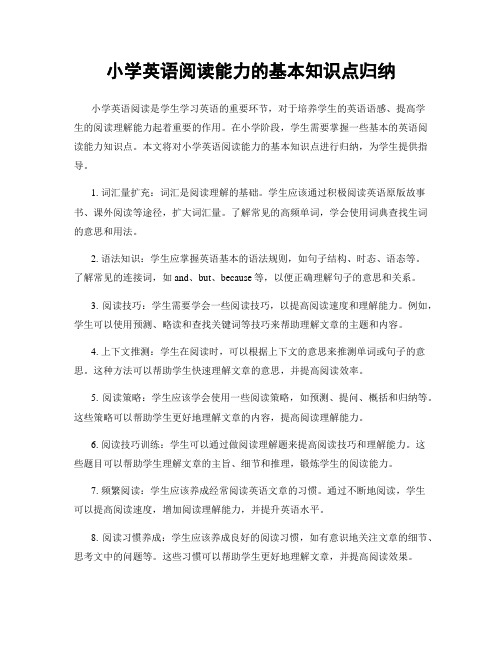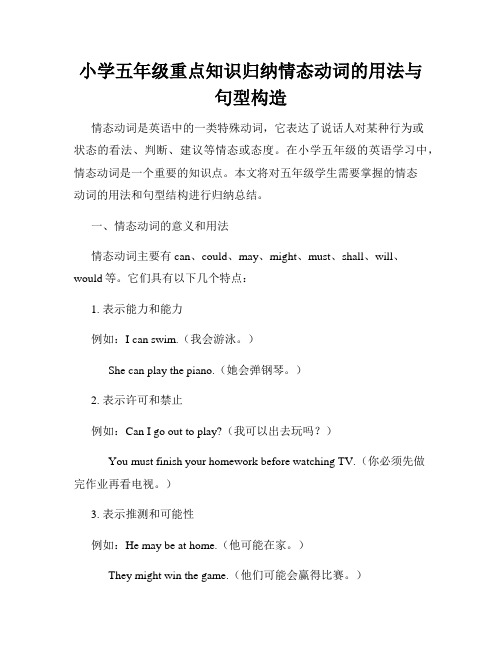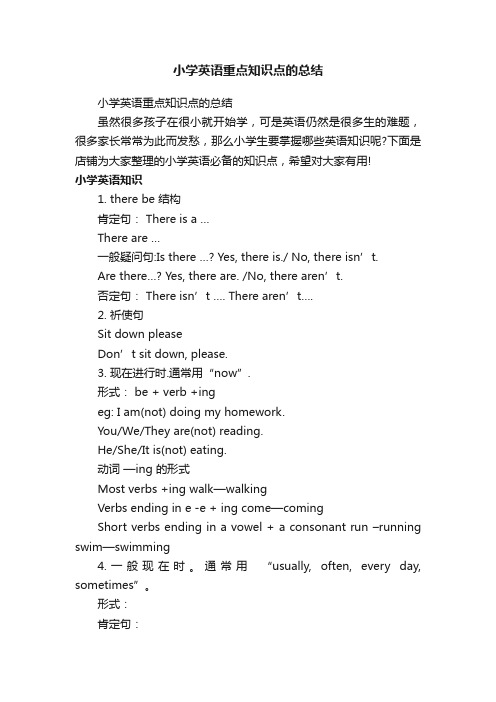小学英语的知识重点归纳
小学英语阅读能力的基本知识点归纳

小学英语阅读能力的基本知识点归纳小学英语阅读是学生学习英语的重要环节,对于培养学生的英语语感、提高学生的阅读理解能力起着重要的作用。
在小学阶段,学生需要掌握一些基本的英语阅读能力知识点。
本文将对小学英语阅读能力的基本知识点进行归纳,为学生提供指导。
1. 词汇量扩充:词汇是阅读理解的基础。
学生应该通过积极阅读英语原版故事书、课外阅读等途径,扩大词汇量。
了解常见的高频单词,学会使用词典查找生词的意思和用法。
2. 语法知识:学生应掌握英语基本的语法规则,如句子结构、时态、语态等。
了解常见的连接词,如and、but、because等,以便正确理解句子的意思和关系。
3. 阅读技巧:学生需要学会一些阅读技巧,以提高阅读速度和理解能力。
例如,学生可以使用预测、略读和查找关键词等技巧来帮助理解文章的主题和内容。
4. 上下文推测:学生在阅读时,可以根据上下文的意思来推测单词或句子的意思。
这种方法可以帮助学生快速理解文章的意思,并提高阅读效率。
5. 阅读策略:学生应该学会使用一些阅读策略,如预测、提问、概括和归纳等。
这些策略可以帮助学生更好地理解文章的内容,提高阅读理解能力。
6. 阅读技巧训练:学生可以通过做阅读理解题来提高阅读技巧和理解能力。
这些题目可以帮助学生理解文章的主旨、细节和推理,锻炼学生的阅读能力。
7. 频繁阅读:学生应该养成经常阅读英语文章的习惯。
通过不断地阅读,学生可以提高阅读速度,增加阅读理解能力,并提升英语水平。
8. 阅读习惯养成:学生应该养成良好的阅读习惯,如有意识地关注文章的细节、思考文中的问题等。
这些习惯可以帮助学生更好地理解文章,并提高阅读效果。
9. 阅读兴趣培养:学生应该培养对英语阅读的兴趣。
选择适合自己的主题和题材的读物,激发学生的学习动力,使阅读变得更加愉快和有效。
10. 多种形式的阅读材料:学生可以通过阅读不同形式的材料,如故事、诗歌、新闻等,锻炼不同类型的阅读技巧,丰富阅读经验。
小学一到六年级英语重点知识归纳

小学一到六年级英语重点知识归纳今天小编为同学们整理分享的是关于小学一到六年级英语重点知识归纳,英语学起来也是很有意思的哦。
接下来就让我们一起来学习一下吧,希望可以帮助到有需要的同学们。
一:学生易错词汇1. a, an的选择: 元音字母开头的单词用an,辅音字母开头的单词用a.2. am , is , are的选择: 单数用is , 复数用are. I 用am , you 用are.3. have , has 的选择: 表示某人有某物.单数用has , 复数用have.I ,you 用have .4. there is, there are 的选择:表示某地有某物,某人.单数用there is , 复数用there are.5. some, any 的选择:肯定句用some, 疑问句和否定句用any.6. 疑问词的选择:what (什么) who (谁) where (哪里) whose (谁的) why(为什么)when(什么时候)which(哪一个)how old (多大) how many (多少)how much(多少钱)二:形容词比较级详解当我们需要对事物作出比较时,需要用到比较级.比较级的句子结构通常是:什么+ 动词be (am , is , are ) + 形容词比较级+ than(比)+ 什么,如:I'm taller and heavier than you. (我比你更高和更重.)An elephant is bigger than a tiger. (一只大象比一只老虎更大.) 形容词的比较级是在形容词的基础上变化而来的,它的变化规则是:①一般的直接在词尾加er ,如tall - taller , strong - stronger ,②以e结尾的,直接加r ,如fine – finer ,③以辅音字母加y结尾的,先改y为i再加er,如funny - funnier④双写最后的字母再加er,如big – bigger, thin – thinner ,hot –hotter☆注意☆比较的两者应该是互相对应的可比较的东西.典型错误:My hair is longer than you.(我的头发比你更长.)比较的两者是我的头发,你(整个人),那么比较的对象就没有可比性.应该改为:My hair is longer than yours. 或My hair is longer than your hair.比较级专项练习: 一,从方框中选出合适的单词完成句子heavy tall long big(1) How is the Yellow River(2) How is Mr Green He's 4375px.(3) How are your feet I wear size 18.(4)How is the fish It's 2kg.三:动词过去式详解动词的过去式的构成规则有:A,规则动词①一般直接在动词的后面加ed:如worked , learned , cleaned , visited②以e结尾的动词直接加d:如lived , danced , used③以辅音字母加y结尾的动词要改y为i再加ed(此类动词较少)如study – studied carry – carried worry – worried (注意play,stay不是辅音字母加y,所以不属于此类)④双写最后一个字母(此类动词较少)如stoppedB,不规则动词(此类词并无规则,须熟记)小学阶段要记住以下动词的原形和过去式:sing – sang , eat – ate , see – saw , have – had , do – did , go - went , take - took , buy - bought , get - got , read - read ,fly - flew , am/is - was ,are - were , say - said , leave - left , swim - swam , tell - told , draw - drew , come - came , lose - lost , find - found , drink - drank , hurt - hurt , feel - felt四:动词现在分词详解动词的ing形式的构成规则:①一般的直接在后面加上ing , 如doing , going , working , singing , eating②以e 结尾的动词,要先去e再加ing ,如having , writing③双写最后一个字母的(此类动词极少)有:running , swimming , sitting , getting五:人称代词六:句型专项归类1.肯定句:是指用肯定的语气来陈述的句子,如:I'm a student. She is a doctor. He works in a hospital.There are four fans in our classroom. He will eat lunch at 12:00. I watched TV yesterday evening.2,否定句:含有否定词或表示否定意义词的句子,如:I'm not a student. She is not (isn't) a doctor.He does not (doesn't) work in a hospital. There are not (aren't) four fans in our classroom.He will not (won't) eat lunch at 12:00. I did not (didn't) watch TV yesterday evening.☆注意☆小结:否定句主要是在肯定句的基础上加上了否定词"not".有动词be的句子则"not"加在be后面,可缩写成"isn't,aren't",但am not 一般都分开写.没有动词be的句子则要先在主要动词的前面加上一个助动词(do,does,did),然后在它后面加上"not",你也可以把它们缩写在一起如"don't , doesn't , didn't ).这三个助动词要根据人称和时态来选择,其中"does"只用于一般现在时主语是第三人称单数的情况,而"did"只用于一般过去时,不论主语是什么人称和数,都用"did" .3,一般疑问句:是指询问事实的句子,此类句子必须用"yes",或"no"来回答.如:Are you a student Yes, I am / No, I'm not.Is she a doctor Yes, she is. / No, she isn't.Does he work in a hospital Yes, he does. / No, he doesn't.Are there four fans in our classroom Yes, there are. / No, therearen't.Are you going to buy a comic book tonight Yes, I am. / No, I am not. (Yes, we are. / No, we aren't.)Will he eat lunch at 12:00 Yes, I will. / No, I will not(won't).Are they swimming Yes, they are. / No, they aren't.Did you watch TV yesterday evening Yes, I did. / No, I didn't.☆注意☆小结:一般疑问句是在肯定句的基础上,①把动词be调到首位,其他照写,末尾标点符号变成问号即可.②没有动词be的句子则要在句首加上一个助动词(do,does,did)再把紧跟在后面的动词变回原形,末尾标点符号变成问号即可.这三个助动词也要根据人称和时态来选择,其中"does"只用于一般现在时主语是第三人称单数的情况,而"did"只用于一般过去时,不论主语是什么人称和数,都用"did" .一般疑问句有个重要的原则就是问和答要一致,即问句里的第一个单词(助动词)和简略答句里的这个词是一致的.4,特殊疑问句:以特殊疑问词(what , where , who , which , when , whose , why , how等)开头引导的句子.此类句子应该问什么就答什么,不能用"yes ,no"来回答.如:What is this It's a computer.What does he do He's a doctor.Where are you going I'm going to Beijing.Who played football with you yesterday afternoon Mike.Which season do you like best Summer.When do you usually get up I usually get up at 6:30.Whose skirt is this It's Amy's.Why do you like spring best Because I can plant trees.How are you I'm fine. / I'm happy.How did you go to Xinjiang I went to Xinjiang by train.☆其中how又可以和其他一些形容词连用组成特殊疑问词组用来提问,如: how many(多少(数量)), how much(多少(钱)), how tall(多高),how long(多长), how big(多大), how heavy(多重)例句:How many pencils do you have I have three pencils.How many girls can you see I can see four girls.How many desks are there in your classroom There are 51.☆小结:how many 用来提问可数名词的数量,主要有以上三种搭配, How many + 名词复数+ do you have 你有多少……How many + 名词复数+ can you see 你能看见多少……How many + 名词复数+ are there… 有多少……七:完全,缩略形式:I'm=I am he's=he is she's=she is they're=they are you're=you are there's=there is they're=they are can't=can not don't=do not doesn't=does not isn't=is not aren't=are not let's=let us won't=will not I'll=I will wasn't=was not总结:通常情况下,'m即am,'s即is(但let's=let us), 're即are ,n't 即not (但can't=can not)。
小学五年级重点知识归纳情态动词的用法与句型构造

小学五年级重点知识归纳情态动词的用法与句型构造情态动词是英语中的一类特殊动词,它表达了说话人对某种行为或状态的看法、判断、建议等情态或态度。
在小学五年级的英语学习中,情态动词是一个重要的知识点。
本文将对五年级学生需要掌握的情态动词的用法和句型结构进行归纳总结。
一、情态动词的意义和用法情态动词主要有can、could、may、might、must、shall、will、would等。
它们具有以下几个特点:1. 表示能力和能力例如:I can swim.(我会游泳。
)She can play the piano.(她会弹钢琴。
)2. 表示许可和禁止例如:Can I go out to play?(我可以出去玩吗?)You must finish your homework before watching TV.(你必须先做完作业再看电视。
)3. 表示推测和可能性例如:He may be at home.(他可能在家。
)They might win the game.(他们可能会赢得比赛。
)4. 表示意愿和请求例如:I will help you.(我会帮助你。
)Could you pass me the pen, please?(请你给我递一支笔,好吗?)二、情态动词的句型构造1. 肯定句情态动词后面直接跟动词原形。
例如:He can swim.(他会游泳。
)They will come tomorrow.(他们明天会来。
)2. 否定句在情态动词后面加not。
例如:I cannot play basketball.(我不能打篮球。
)She will not go to the party.(她不会参加聚会。
)3. 疑问句将情态动词放在句子的开头。
例如:Can you help me?(你能帮助我吗?)Will she come to the concert?(她会来听音乐会吗?)4. 一般疑问句回答主语+情态动词。
小学英语重点知识点的总结

小学英语重点知识点的总结小学英语重点知识点的总结虽然很多孩子在很小就开始学,可是英语仍然是很多生的难题,很多家长常常为此而发愁,那么小学生要掌握哪些英语知识呢?下面是店铺为大家整理的小学英语必备的知识点,希望对大家有用!小学英语知识1. there be 结构肯定句:There is a …There are …一般疑问句:Is there …? Yes, there is./ No, there isn’t.Are there…? Yes, there are. /No, there aren’t.否定句:There isn’t …. There aren’t….2. 祈使句Sit down pleaseDon’t sit down, please.3. 现在进行时.通常用“now”.形式: be + verb +ingeg: I am(not) doing my homework.You/We/They are(not) reading.He/She/It is(not) eating.动词—ing 的形式Most verbs +ing walk—walkingVerbs ending in e -e + ing come—comingShort verbs ending in a vowel + a consonant run –running swim—swimming4.一般现在时。
通常用“usually, often, every day, sometimes”。
形式:肯定句:I go to school on foot every day.She goes to school on foot every day.一般疑问句:Do you jump high? Yes, I do. / No, I don’t.Does he jump high? Yes, he does. / No, he doesn’t.否定句:We don’t go to school on Sundays.My mother doesn’t like watching TV in the evening.5. (情态)动词can,must, should 后面直接用动词原形。
小学英语和体育课程的重要知识点总结

小学英语和体育课程的重要知识点总结小学阶段是孩子们学习基础知识和发展基本技能的关键时期。
在这个阶段,英语和体育课程被认为是学校教育非常重要的两个学科。
本文将总结小学英语和体育课程的重要知识点,以帮助学生更好地掌握这些学科的基本内容。
一、小学英语的重要知识点总结1. 词汇与句型:小学英语的词汇主要包括基本的动词、名词、形容词、副词等。
学生应掌握常见的单词拼写和意义,并能灵活运用于日常对话和简单句子中。
2. 语法知识:在语法方面,小学生应学会基本的时态(一般现在时、一般过去时、将来时等)的用法,以及基本的句子结构。
理解主谓一致、比较级与最高级等基本概念也是十分重要的。
3. 听力与口语:小学生在语言学习中,应培养良好的听力与口语能力。
通过听力训练,掌握基本的听力技巧,并能听懂简单的对话和指令。
同时,通过口语练习,学生应能够自信地表达自己的意见和与他人进行简单对话。
4. 阅读与写作:阅读是英语学习的重要环节。
学生应阅读适合自己水平的故事书、简易读物和文章,从中提高词汇量、理解力和阅读能力。
在写作方面,学生应学会书写简单的句子、短文和日记等,并能表达自己的思想和感受。
5. 文化与文学:小学英语的学习不仅仅是语言知识,还应包括文化和文学方面的内容。
学生应了解一些英语国家的文化习俗、传统节日和英文童谣等。
同时,学习一些简单的英语经典故事和诗歌也是培养学生对英语兴趣的重要途径。
二、小学体育课程的重要知识点总结1. 基本动作和体能:小学生体育课程的教学重点在于培养学生的基本运动技能和体能素质。
学生应学习掌握跑、跳、投、抓等基本动作,同时通过锻炼提高体力、耐力和协调能力。
2. 健康知识:体育课程也应教授一些基本的健康知识,包括饮食、运动和卫生等方面的内容。
学生应了解有关健康生活方式的重要性,并学会制定合理的饮食计划和适当的锻炼方案。
3. 团队合作:体育课程是培养学生团队合作精神的重要途径。
通过集体游戏、团体训练等活动,学生应学会与他人合作、分工合作以及倾听和尊重他人等重要技能。
小学一到六年级英语重点知识归纳

小学一到六年级英语重点知识归纳一:学生易错词汇1. a, an的选择: 元音字母开头的单词用an,辅音字母开头的单词用a.2. am , is , are的选择: 单数用is , 复数用are. I 用am , you 用are.3. have , has 的选择: 表示某人有某物.单数用has , 复数用have. I ,you 用have .4. there is, there are 的选择:表示某地有某物,某人.单数用there is , 复数用there are.5. some, any 的选择:肯定句用some, 疑问句和否定句用any.6. 疑问词的选择:what (什么) who (谁) where (哪里) whose (谁的) why(为什么)when(什么时候)which(哪一个)how old (多大) how many (多少)how much(多少钱)二:形容词比较级详解当我们需要对事物作出比较时,需要用到比较级.比较级的句子结构通常是:什么+ 动词be (am , is , are ) + 形容词比较级+ than(比)+ 什么,如:I'm taller and heavier than you. (我比你更高和更重.)An elephant is bigger than a tiger. (一只大象比一只老虎更大.)形容词的比较级是在形容词的基础上变化而来的,它的变化规则是:①一般的直接在词尾加er ,如tall - taller , strong - stronger ,②以e结尾的,直接加r ,如fine –finer ,③以辅音字母加y结尾的,先改y为i再加er,如funny - funnier④双写最后的字母再加er,如big –bigger, thin –thinner ,hot –hotter☆注意☆比较的两者应该是互相对应的可比较的东西.典型错误:My hair is longer than you.(我的头发比你更长.)比较的两者是我的头发,你(整个人),那么比较的对象就没有可比性.应该改为:My hair is longer than yours. 或My hair is longer than your hair.比较级专项练习: 一,从方框中选出合适的单词完成句子heavy tall long big(1) How is the Yellow River(2) How is Mr Green He's 4375px.(3) How are your feet I wear size 18.(4)How is the fish It's 2kg.三:动词过去式详解动词的过去式的构成规则有:A,规则动词①一般直接在动词的后面加ed:如worked , learned , cleaned , visited②以e结尾的动词直接加d:如lived , danced , used ③以辅音字母加y结尾的动词要改y为i再加ed(此类动词较少)如study –studied carry –carried worry –worried (注意play,stay不是辅音字母加y,所以不属于此类)④双写最后一个字母(此类动词较少)如stoppedB,不规则动词(此类词并无规则,须熟记)小学阶段要记住以下动词的原形和过去式:sing –sang , eat –ate , see –saw , have –had , do –did , go - went , take - took , buy - bought , get - got , read - read ,fly - flew , am/is - was ,are - were , say - said , leave - left , swim - swam , tell - told , draw - drew , come - came , lose - lost , find - found , drink - drank , hurt - hurt , feel - felt四:动词现在分词详解动词的ing形式的构成规则:①一般的直接在后面加上ing , 如doing , going , working , singing , eating②以e 结尾的动词,要先去e再加ing ,如having , writing③双写最后一个字母的(此类动词极少)有:running , swimming , sitting , getting五:人称代词六:句型专项归类1.肯定句:是指用肯定的语气来陈述的句子,如:I'm a student. She is a doctor. He works in a hospital.There are four fans in our classroom. He will eat lunch at 12:00. I watched TV yesterday evening.2,否定句:含有否定词或表示否定意义词的句子,如:I'm not a student. She is not (isn't) a doctor.He does not (doesn't) work in a hospital. There are not (aren't) four fans in our classroom.He will not (won't) eat lunch at 12:00. I did not (didn't) watch TV yesterday evening.☆注意☆小结:否定句主要是在肯定句的基础上加上了否定词"not".有动词be的句子则"not"加在be后面,可缩写成"isn't,aren't",但amnot 一般都分开写.没有动词be的句子则要先在主要动词的前面加上一个助动词(do,does,did),然后在它后面加上"not",你也可以把它们缩写在一起如"don't , doesn't , didn't ).这三个助动词要根据人称和时态来选择,其中"does"只用于一般现在时主语是第三人称单数的情况,而"did"只用于一般过去时,不论主语是什么人称和数,都用"did" .3,一般疑问句:是指询问事实的句子,此类句子必须用"yes",或"no"来回答.如:Are you a student Yes, I am / No, I'm not.Is she a doctor Yes, she is. / No, she isn't.Does he work in a hospital Yes, he does. / No, he doesn't.Are there four fans in our classroom Yes, there are. / No, there aren't.Are you going to buy a comic book tonight Yes, I am. / No, I am not. (Yes, we are. / No, we aren't.)Will he eat lunch at 12:00 Yes, I will. / No, I will not(won't).Are they swimming Yes, they are. / No, they aren't.Did you watch TV yesterday evening Yes, I did. / No, I didn't.☆注意☆小结:一般疑问句是在肯定句的基础上,①把动词be调到首位,其他照写,末尾标点符号变成问号即可.②没有动词be的句子则要在句首加上一个助动词(do,does,did)再把紧跟在后面的动词变回原形,末尾标点符号变成问号即可.这三个助动词也要根据人称和时态来选择,其中"does"只用于一般现在时主语是第三人称单数的情况,而"did"只用于一般过去时,不论主语是什么人称和数,都用"did" .一般疑问句有个重要的原则就是问和答要一致,即问句里的第一个单词(助动词)和简略答句里的这个词是一致的.4,特殊疑问句:以特殊疑问词(what , where , who , which , when , whose , why , how等)开头引导的句子.此类句子应该问什么就答什么,不能用"yes ,no"来回答.如:What is this It's a computer.What does he do He's a doctor.Where are you going I'm goingto Beijing.Who played football with you yesterday afternoon Mike.Which season do you like best Summer.When do you usually get up I usually get up at 6:30.Whose skirt is this It's Amy's.Why do you like spring best Because I can plant trees.How are you I'm fine. / I'm happy.How did you go to Xinjiang I went to Xinjiang by train.☆其中how又可以和其他一些形容词连用组成特殊疑问词组用来提问,如: how many(多少(数量)), how much(多少(钱)), how tall(多高), how long(多长), how big(多大), how heavy(多重)例句:How many pencils do you have I have three pencils.How many girls can you see I can see four girls.How many desks are there in your classroom There are 51.☆小结:how many 用来提问可数名词的数量,主要有以上三种搭配,How many + 名词复数+ do you have 你有多少……How many + 名词复数+ can you see 你能看见多少……How many + 名词复数+ are there…有多少……七:完全,缩略形式:I'm=I am he's=he is she's=she is they're=they are you're=you are there's=there is they're=they are can't=can not don't=do not doesn't=does not isn't=is not aren't=are not let's=let us won't=will not I'll=I will wasn't=was not总结:通常情况下,'m即am,'s即is(但let's=let us), 're即are ,n't即not (但can't=can not)小学一到六年级英语重点知识归纳。
小学英语语法重点知识归纳
小学英语语法重点知识归纳1.“any”一些;用在否定句和一般疑问句,与“some”同义。
“some”用在肯定句中。
2.there be句型,采用“就近原则”。
3.can 后+动词原形。
Do,does.did 后面的动词用原形。
4.play+the+乐器; play+运动类5.Let’s后接动词原形let’s play basketball!6.fish,sheep deer单复数一样。
7.What’s …like?是问某某长得什么样子,它的答语一般用:He/She/ It is…(后面跟描写人的外貌特征的词语),What does your father like? 你爸爸喜欢什么?8.表示“一个”a, e, i,o, u开头的单词一般用an,例如an apple。
(university除外)9.表示星期,月份,国家的名词,开头第一个字母都要大写。
Weekend周末(指周六和周日),一个星期的第一天是星期天10.on+星期或者具体日期。
At+时间. 如at 6:30。
In+月份11.I like Sundays.是指所有的星期日,所以用复数形式。
I’d=I would12. tomato 和potato 的复数形式在后面加es, tomatoes, potatoes。
13.on与over的区别:on,两者之间有接触,over,两者之间不接触,悬空。
1) what 什么, What’s this? 这是什么?2)where 哪里,如Where are you? 你来自哪里?3)who 谁。
用来问人物是谁?如Who’s that man? 那个男人是谁?4)whose 谁的,如: Whose book is this ? 这是谁的书?6)what colour 什么颜色,用来问物体是什么颜色的。
7)when 什么时候,用来问时间,如: When do you get up?8) how 怎么样?如:How are you? 你好吗?9)how many 多少。
小学英语学习基础知识材料(复习材料学习总结要点)及其重要材料句型.docx
小学英语基础知识(复习要点)及重点句型一、词汇(一)名词:1.人物:boy/girl/mother/father/brother/sister/friend/cousin/driver (司机)/dancer/pupil/teacher/policeman/nurse/farmer/doctor/Ms/Mr2.动物:animal/dragon/1iger /1 ion/e 1 ephant/monkey/panda/dog/cat/bird3.五官、身体部分:head/eye/nose/ear/mouth/hand/arm/foot/leg/hair4 . 食物:food/cake/rice/meat/bread/noodles/soup/fish/chocolate/mango/banana/apple/pear/orange/peanut/sweets/biscuit/vegetable/miIk/fruit/Watermelon/ice cream/cheese/juice/coffeetea5.场所方位:classroom/class/school/home/farm/house/road/supermarket/station/park/lake/sea/river/east/west/north/south6.国家:China/Eng 1 and/America/country7.交通工具:bike/bus/train/boat/plane8.学科:English/Chinese/Math/Science9.玩:kite/toy/computer/game/doll/jigsaw/chess/bal110.文具:bag/pencil/pen/book11.时间:time/today/day/hour/yesterday/tomorrow/morning/afternoon/Evening/weekend/spring/summer/autumn/winter/January/February/March/April/May/June/July/August/September/October/November/ December/Sunday/Monday/Tuesday/Wednesday/Thursday/Friday/ Saturday12.月艮装:hat/dress/coat/T-shirt/clothes/sweater13.教室中的物品:desk/chair/door/window14.其它名词:name/present/box/bottle/song/winner/Christmas/tree/letter/metre/kilo/homework/robot/weather/postcard/matter/game/life/radio/Cold/headache/fever(二)动词:1・运动:play football/basketball/table tennis, do morning exercises, go swimming, go cycling, run, high jump, ride, row a boat,2.系动词:am/is/are/was/were/feel/smell3.情态动词:can/need/may/should4.其它动作:want/make/cook/wash/please/draw/ thank/think/sit down/stand up/know/help/hope/look/see/have/has/like/sing/read/write/draw/1earn/list en/hear/say/talk/tell/study/speak/drink/drop/laugh/give/visit/catch/dance/live/agree/stop/finish/wait/ get up/have breakfast/go to school/go to work/have lunch/ go home/have dinner/watchTV/take pictures/go straight on/turn right/turn left/understand/argue/wearwent bought had met ran lost learnt(三)形容词:1.颜色:red/blue/yellow/green/black/orange/purple/pink/white2.天气:hot/co Id/warm/ cool/windy/sunny3.心情、感觉:fine/happy/favorite/hungry/difficult/thirsty/sad/bored/Angry/tired/sorry4.其它:big/small/short/tall/old/young/new/thin/fat/great/strong/blind/deaf/nice/shy/clever/naughty/cool/cute/good/bad/careful/Long/wide/interesting/beautiful/wonderful/many/much/famous/quiet/dangerous/better/worse/useful/last/dear/clean/enough(四)副词:1.疑问副词:where/when/how/why2.其它昂ij词:here/there/now/then/very/up/down/fast/high/well/badly/Really/hard(五)代词:1.人称代词:I/we/you/he/she/they/it2.物主代词:my/our/your/his/her/their/its/mine/yours/hers/his3.指示代词:this/that/these/those4.不定代词:some/many/much/any5.疑问代词:what/whose/How many/How old/who/How much,(六)数词:one/two/three/four/five/six/seven/eight/nine/ten/eleven/ twelve/thirteen/fourteen/fifteen/sixteen/seventeen/eighteen/nineteen/twenty/thirty/forty/fifty/sixty/seventy/eighty/ninety/ hundred (七)介词:on/in/under/to/at/past/by/with(八)冠词:a/an/the(九)连词:and/but/because/so/than(十)其它:Yes/No/Hello/Goodbye/Thank you/too/Happy birthday/o, clock/ Happy New Year/Spring Festival/Children, s Day/Let, s/Excuse me/Sport Day/Goodluck/Come on/Of course/The Great Wall二、句型1.日常问候:① Hello, Hi ② How are you? ③ How do you do?④ Good morning, (afternoon, evening , night)介绍自己:① I am .② My name is ____________ ③ I , m from ___________ ④ I (don' t )like⑤ I can (can ,t ). 3.4.be/系动词:am/is /are 及用法:我用am,你用are, 5. 提问姓名及年龄问答: (1) -What , s your name? -My name is. -I am.(2) -How old are you?-I ,m . 6. 颜色问答: -What , s his name? -His name is.-He is. -How old is he?-He is .is 连着他、她、它。
小学五年级英语语法重点知识梳理
小学五年级英语语法重点知识梳理在小学五年级的英语学习中,语法是一个关键的组成部分。
理解和掌握这些语法知识不仅能帮助学生提高语言能力,还能为他们未来的学习打下坚实的基础。
让我们一起走进这个充满挑战与乐趣的英语语法世界,发现并梳理其中的重点知识。
首先,名词的单数与复数形式是小学五年级学生需要掌握的重要内容。
名词可以分为可数名词和不可数名词。
可数名词如"book"和"apple"在单数形式中表示一个物体,而在复数形式中则表示多个物体,如"books"和"apples"。
复数形式通常通过在名词后加上"-s"或"-es"来形成。
例如,"dog"变成"dogs",而"box"变成"boxes"。
学生需要记住一些特殊的复数形式,如"child"变成"children"和"mouse"变成"mice"。
接下来,动词时态的使用是另一个重要的语法点。
小学五年级的学生需要掌握基本的时态,如一般现在时、一般过去时和将来时。
一般现在时用来描述经常发生的动作或事实,例如"I eat breakfast every morning"。
一般过去时则用于谈论过去发生的事情,例如"I visited the zoo yesterday"。
将来时用于表示即将发生的事情,如"I will go to the park tomorrow"。
理解这些时态的变化规则是学习英语的关键。
除了时态,动词的规则与不规则变化也是学习的重要内容。
规则动词在过去式和过去分词中一般通过加"-ed"来形成,如"play"变成"played"。
(完整)PEP小学英语五年级下册各单元知识重点归纳-推荐文档
PEP五年级下册各单元知识重点Unit 1 This Is My Day我会背:do morning exercises晨练eat breakfast吃早饭have english class上英语课play sports进行体育运动eat dinner吃晚饭when什么时候evening夜晚;晚上get up起床at在……点钟usually通常;一般noon中午climb mountains爬山go shopping购物;买东西play the piano弹钢琴visit grandparents看望祖父母go hiking去远足weekend周末often经常sometimes有时候话题: 日常生活1. When do you do morning exercises? 你什么时候做早操?.usuall.d.mornin.exercise.a.8:00......我经常八点钟做早操。
(.usuall.ge.u.a.12:0.noo........我经常在中午十二点起床。
)2. When do you eat dinner ? 你什么时候吃晚餐?.ea.dinne.a.7:0.i.th.evening........我在晚上七点钟吃晚餐。
3.Wha.d.yo.d.o.th.weeken......... 你周末做什么?.usuall.clim.mountains. 我通常去爬山. .ofte.pla.sport..我经常经行体育锻炼。
Sometime..pla.th.pian..有时候我弹钢琴。
Unit 2 My Favourite Season我会背:spring春天summer夏天fall秋天winter冬天season季节which哪一个best最;极swim游泳fly kites放风筝skate滑冰make a snowman堆雪人plant trees种树why为什么because因为sleep睡觉favourite 最喜爱的话题: 季节1. Which season do you like best ? I like spring best.(Spring.)你最喜欢是什么季节?我最喜欢春季。
- 1、下载文档前请自行甄别文档内容的完整性,平台不提供额外的编辑、内容补充、找答案等附加服务。
- 2、"仅部分预览"的文档,不可在线预览部分如存在完整性等问题,可反馈申请退款(可完整预览的文档不适用该条件!)。
- 3、如文档侵犯您的权益,请联系客服反馈,我们会尽快为您处理(人工客服工作时间:9:00-18:30)。
小学英语的知识重点归纳
小学英语必备的知识重点归纳
对于小学来说,要想学好一门外语并非易事。平时要熟练掌握课
文的知识内容,理解语言点和单元语法,勤加复习。下面是店铺为大
家整理的小学英语知识要点总结,希望对大家有用!
小学英语重点知识
一、代词:人称代词,物主代词
人称代词物主代词
主格宾格
第一
人称单数I(我)memy(我的)
复数we(我们)usour(我们的)
第二
人称单数you(你)youyour(你的)
复数you(你们)youyour(你们的)
第三
人称单数he(他)himhis(他的)
she(她)herher(她的)
it(它)itits(它的)
复数they(他们/她们/它们)themtheir(他们的/她们的/它们的)
二、形容词,副词:比较级,最高级
(一)、形容词的比较级
1、形容词比较级在句子中的运用:两个事物或人的比较用比较级,
比较级后面一般带有单词than。比较级前面可以用more, a little来修
饰表示程度。than后的人称代词用主格(口语中可用宾格)。
2.形容词加er的规则:
⑴ 一般在词尾加er ;
⑵ 以字母e 结尾,加r ;
⑶ 以一个元音字母和一个辅音字母结尾,应双写末尾的.辅音字母,
再加er ;
⑷ 以“辅音字母+y”结尾,先把y变i,再加er 。
3.不规则形容词比较级:
good-better, beautiful-more beautiful
(二)副词的比较级
1.形容词与副词的区别(有be用形,有形用be;有动用副,有副用
动)
⑴在句子中形容词一般处于名词之前或be动词之后
⑵副词在句子中最常见的是处于实义动词之后
2.副词比较级的变化规则基本与形容词比较级相同(不规则变化:
well-better, far-farther)
小学英语必考知识
冠词
不定冠词,定冠词种类:
(1)不定冠词:a / an a unit / an uncle
元音开头的可数名词前用an :
an egg / an apple / an orange / an eraser / an answer / an ID
card / an alarm clock / an actor / an actress / an e-mail / an
address / an event / an example / an opera / an houran old man
/ an interesting book / an exciting sport / an action movie / an
art lesson /
(2)定冠词:the the egg the plane
2. 用法:
定冠词的用法:
(1)特指某(些)人或某(些)物: The ruler is on the desk.
(2)复述上文提到的人或物:He has a sweater. The sweater is
new.
(3)谈话双方都知道的人或物:The boys aren’t at school.
(4)在序数词前: John’s birthday is February the second.
(5)用于固定词组中: in the morning / afternoon / evening
不用冠词的情况:
(1)专有名词前:China is a big country.
(2)名词前有定语:this , that , my , your , some, any , no 等:
This is my baseball.
(3)复数名词表示一类人和事:Monkeys can’t swim. They are
teachers.
(4)在节日,日期,月份,季节前:Today is Christmas Day. It’s
Sunday.
(5)一日三餐前:We have breakfast at 6:30.
(6)球类 棋类运动前:They often play football after class. He
plays chess at home.
* 但乐器前要用定冠词:I play the guitar very well.
(7)学科名称前:My favorite subject is music.
(8)在称呼或头衔的名词前:This is Mr Li.
(9)固定词组中:at noon at night by bus
小学英语基础知识
数词:基数词、序数词
基数词
(1)1-20
one,two,three,four,five,six,seven,eight,nine,
ten,eleven,twelve,thirteen,fourteen,fifteen, sixteen,
seventeen,eighteen,nineteen,twenty
(2)21-99 先说“几十”,再说“几”,中间加连字符。
23→twenty-three,34→thirty-four,45→forty—five,
56→fifty-six,67→sixty-seven,78→seventy-eight,89→eighty-
nine,91→ninety-one
(3)101—999先说“几百”,再加and,再加末两位数或末位数;
586→five hundred and eighty-six,803→eight hundred and
three
(4)l,000以上,先从右往左数,每三位数加一个“,”,第一个
“,”前为thousand.第二个“,”前为million,第三个“,”前为
billion
1,001→one thousand and one
18,423→eighteen thousand,four hundred and twenty-
three
6,260,309→six million two hundred and sixty thousand
three hundred and nine
750,000,000,000→seven hundred and fifty billion
序数词
(1)一般在基数词后加th
eg.four→fourth,thirteen→thirteenth
(2)不规则变化
one→first,two→second,three→third,five→fifth,
eight→eighth,nine→ninth,twelve—twelfth
(3)以y结尾的十位整数,变y为ie再加th
twenty→twentieth, forty→fortieth, ninety→ninetieth
(4)从二十一后的“几十几”直至“几百几十几”或“几千几百几
十几”只将个位的基数词变为序数词。
